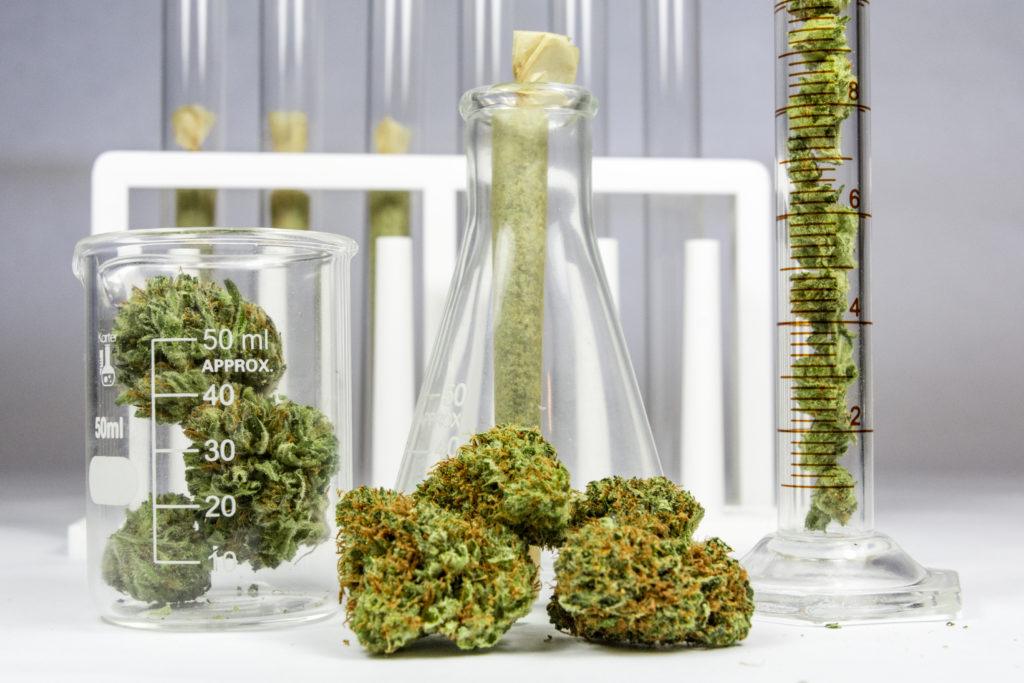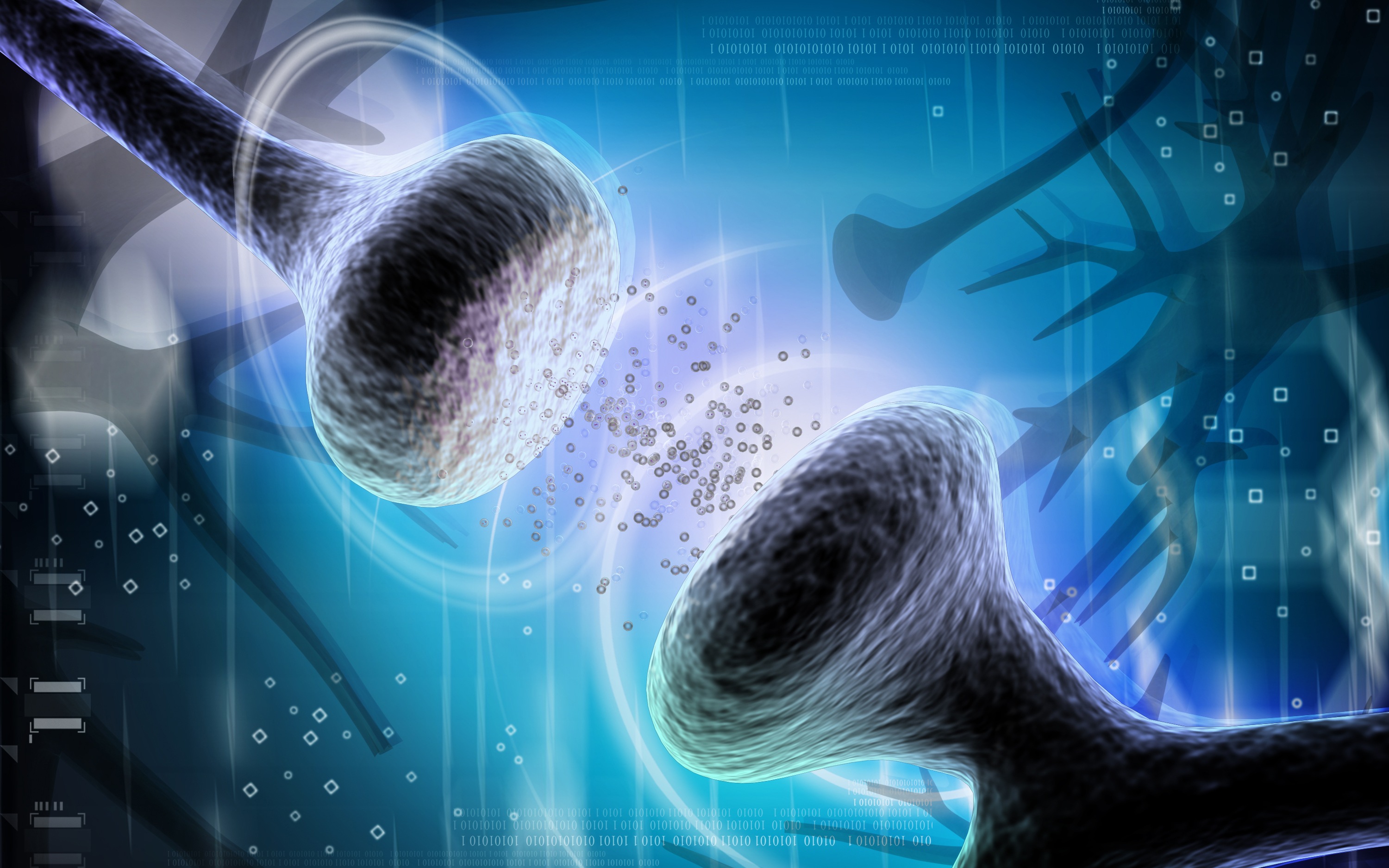
Although cannabis isn’t often recognized as a member of the psychedelic family, marijuana and psychedelics share many common features. Moderate to high doses of cannabis can result in psychedelic-type effects such as synesthesia, enhanced perception of music, the emergence of unconscious emotions, and unrestrained creativity.1 Another similarity that cannabis shares with psychedelics is in receptor binding.
Scientists classify a drug as psychedelic if it binds to serotonin 5-HT2A receptors (5-HT2AR) as an agonist or partial agonist.2 Emerging research suggests that THC (tetrahydrocannabinol) interacts with 5-HT2AR, which is known for its role in facilitating psychedelic experiences.3
What is the 5-HT2A Receptor?
5-HT2AR, sometimes colloquially called psychedelic receptors, are widely distributed through the central nervous system and are particularly prevalent in the learning and cognition centers of the brain.2
Preclinical studies have demonstrated that 5-HT2AR antagonists boast antipsychotic and antidepressant properties. 5-HT2AR agonists, on the other hand, possess cognition-enhancing and hallucinogenic properties.4 An extensive body of preclinical and human evidence suggests the activation of 5-HT2AR is responsible for generating hallucinatory experiences and the behavioral effects that accompany them.5,6
The Interaction Between THC and 5-HT2AR
Much cannabis research is focused on its interactions at the body’s cannabinoid receptors, which are members of the G protein-coupled receptor family.7 However, a 2018 preclinical study set out to explore how THC behaves at the 5-HT2AR.3 The study, which was carried out on mice, tested the effects of chronic THC exposure on 5-HT2AR in cortical regions of the brain. The researchers found that long-term exposure to THC sensitized 5-HT2AR triggered a psychosis-type alteration in their signaling mechanism.
These findings suggest that THC’s binding with the 5-HT2AR leads to the overactivation of the pro-hallucinogenic signaling pathways. Consequently, this functional alteration of the receptor may lead to increased susceptibility of psychotic states, schizophrenic-type responses, and hallucinations. Other research also indicated that an increased density in the functional conformation of 5-HT2AR had been found in schizophrenic patients’ brains.8

Creations /Shutterstock
How Does THC Bind to 5-HT2A and Influence its Activity?
According to Ibarra-Lecue et al., interactions between the endocannabinoid and serotonergic systems have been widely reported. Unfortunately, studies that assess the effects of cannabinoids on 5-HT2AR functionality are limited. The authors suggest that a CB1R/5-HT2AR heteromer may hold the key to understanding this interaction, at least in part (CB1R is the cannabinoid receptor type 1). Heteromers are macromolecular complexes composed of at least two functional receptor units and display biochemical properties that are noticeably different from those of its individual components.
A 2015 study on mice showed that CB1 and 5-HT2A receptors create novel effects when they interact.9 When CB1 receptors entwine with 5-HT2AR, new signaling pathways fire up that lead to memory impairment, cognitive deficits, anxiolytic properties, and pro-social effects. These effects were reduced in mice when deletions were made in the genes that code for 5-HT2AR.
What Are the Implications of These Findings?
The implications of this research are significant for cannabis therapy. Cannabis may hold immense potential as a therapeutic agent, but memory impairment and cognitive impairments often inhibit its use. The data presented by Ibarra-Lecue et al. and Viñals et al. suggest that CB1R/5-HT2AR heteromers may be responsible for the less desirable qualities of THC. These heterocomplexes could potentially be disrupted to dissociate the cognitive impairment linked to THC use.
Nonetheless, this research is still in its infancy. Viñals et al acknowledge that there may be more subtle mechanisms at play than the mere expression of heteromeric receptors. Future studies may also reveal more about the entanglement of the endocannabinoid and serotonergic systems.
This might also explain why some people find the clarity of a peak psychedelic experience is reduced by concomitant cannabis use, whereas when one is coming down, the use of cannabis can be relaxing
I’d like to see research done on the synergistic effects of cannabis and classics, like magic mushrooms. I have anecdotal, psychological theories that cannabis works on the ego and antagonizes areas of the brain such as the amygdala (sometimes inducing paranoia). Whereas psilocin bypasses the ego (by shutting down the default mode network, and specifically the amygdala). My theory is that the two can be synergistic, but the order of ingestion, and the dosage of the two are critical in predicting the outcomes. Disclaimer: I am not a scientist, but I am an engineer and love to figure out how… Read more »
I see you posted this a year ago but you were onto something. I am on an antidepressant called nefazodone which is 5HT2a antagonist. Because of this when I take LSD or mushrooms they don’t work very well unless I take higher doses. The case of mushrooms I get a nice mellow buzz but no visual effects other than vivid colors. This is actually quite nice because sometimes I don’t really love everything breathing and confusing My medication and the psychedelics are in effect doing the opposite thing which is oversimplifying but partially true. Here’s the rub. If I take… Read more »
Creo que el Cannabis es una herramienta fantástica… y que la aparente “psicosis” que el THC genera es un estado bioquímico muy mal entendido por muchos investigadores.
Legalizing psychedelics could rescue people from mental illness—-reducing the financial cost and horrible pain of institutionalization.
Likewise it would reduce recidivism from crime reducing America’s epic incarceration.
We owe our slofies’ treatment for PTSD.
We could release the fear and pain of death in terminal patients.
That’s only the beginning. —-Perhaps w
akashic wisdom is in our future.
My 24 year old daughtee has been suffering with BPD since she was 16. She has always been under the care of psychiatrists and therapists to no long term avail. This is something she wod definitely benefit from on a trial basis. If one is available, please forward the information. She fights for her life on a daily basis. Many thanks.